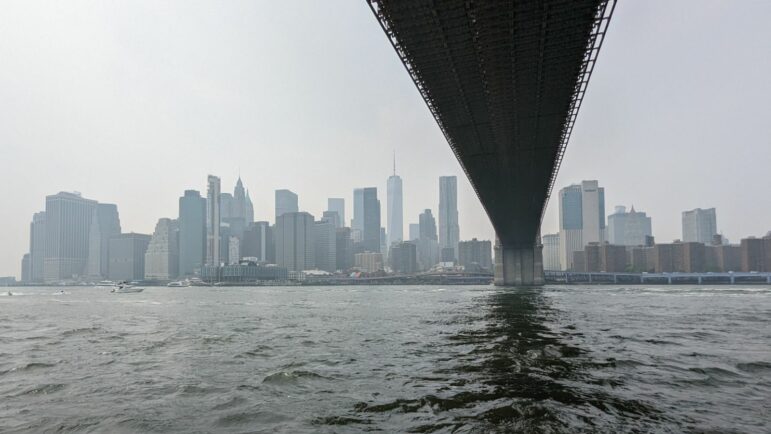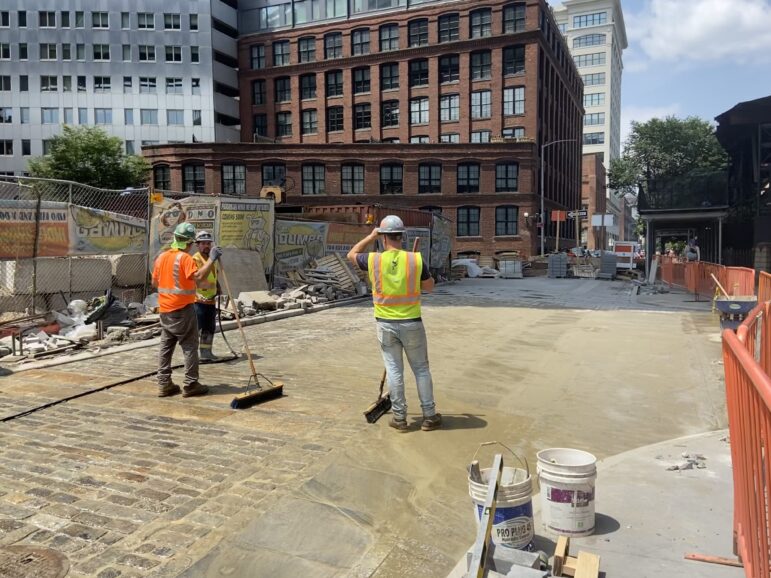Construction workers are used to long days in the summer heat. But braving wildfire smoke is new territory for them.

Adi Talwar
The city’s hazy skyline on Friday, June 30, 2023.On Thursday morning, Hildalyn Colon Hernández, deputy director for New Immigrant Community Empowerment (NICE)—a nonprofit in Queens that trains immigrants for jobs in the construction field—was at a parada in Jackson Heights, a meeting point for day laborers, handing out masks to those looking for work.
That day, the city’s Air Quality Index (AQI) would tick above 150—what’s considered ‘unhealthy’ under the U.S. Environmental Protection Agency’s assessment system—marking the second week in a month that New York issued an air quality advisory as a result of smoke from Canadian wildfires.
While the group of those waiting for work in Queens was smaller than usual, about 100 people still showed up Thursday morning, said Colon Hernández. As she made her rounds, she was met with confusion: Some hadn’t heard about the impending wildfire smoke and others didn’t see the point in wearing a mask.
“That is not their priority at this point,” Colon Hernández said. “They’re just looking for work.”
Construction workers are used to long days in the summer heat. But braving wildfire smoke is new territory for them. Like other impacts of the climate crisis, recent bouts of bad air quality have raised new questions about how best to protect New Yorkers whose jobs and living conditions put them at greater risk of harm.
According to the Occupational Safety and Health Administration (OSHA), outdoor workers exposed to smoke-polluted air can experience heat stress, eye and respiratory tract irritation, and other respiratory issues. California, a state now accustomed to regular wildfire pollution, requires employers to put certain protective measures in place for outdoor workers once the AQI surpasses 151.
On Thursday morning, when New York expanded a health advisory issued the day before to include the entire state, some construction workers told City Limits they had not received notifications from their employers about the deteriorating air quality. “We really didn’t know much about today,” said one worker at a site in Dumbo who wished to remain anonymous.
A spokesperson for the Department of Design (DDC)—which oversees contractors who work on public building projects (just a piece of the city’s construction pie)—told City Limits it issued an internal air quality health advisory Thursday afternoon to all DDC staff and contractors encouraging them to keep an eye on the forecast and to wear high quality N95 Masks.
The agency took more stringent measures when wildfire smoke first infiltrated the city in early June, when the AQI spiked as high as 413 in some parts of the city. The DDC issued a notice on that Wednesday, June 7, instructing contractors to move work indoors until Friday, June 9.
After receiving the notification, Mike, 38, who works as a superintendent on a DDC construction project, advised workers of the protocol. They packed up for the day and returned after things cleared up. “I think if they knew it was coming in that quick that would have stopped us that [first] day too,” said Mike.

Mary Cunningham
Workers at a construction site in Brooklyn on Thursday, when a statewide air quality advisory was in effect.
With a new round of smoke clogging up New York’s air this week, union groups like The Building and Construction Trades Council of Greater New York were urging workers to take precautions. The building trade’s president, Gary LaBarbera, said in a statement that he had “relayed the health risks associated with an air quality index of over 150 to our members.”
“Maintaining the health and well-being of our members is of utmost importance and the recent dips in air quality arising from the Canadian Wildfires has us very concerned,” said LaBarbera.
But only a portion of New York’s construction jobs—just more than a fifth in 2019 before the pandemic, according to a comptroller’s office report—are held by union members.
Safety precautions around air quality will therefore vary depending on the employer, a number of construction workers told City Limits Friday at a training workshop hosted by NICE.
Nelson, a 46-year-old construction worker who does scaffolding in the Bronx for EXO Construction Inc., said his company halted work both during the first round of wildfire smoke and on Friday, June 30.
Mirian Cumbicos, who is currently doing plaster and paint work at a site on 14th Street, said her employer also called off work on Friday. While she and her fellow workers spend most of their time inside, her employer decided to cancel given that they normally keep windows and doors open, Cumbicos said.
The type of protective equipment offered also varies employer to employer. Ivonne Molano, who previously worked in construction and now works at NICE, said it’s not the norm for employers to provide protective equipment. If anything, she said, they will hand out medical masks, which the CDC says do not offer sufficient respiratory protection for workers.
“There are employers who are going to take away outside work when there’s risk, and they’re going to provide you with the appropriate mask,” said Colon Hernández, NICE’s deputy director. “But there’s also employers that are going to disregard all of these notices and keep people working outside.”
Immigrants make up a large part of the construction workforce—according to a state comptroller report, they held 53 percent of the construction jobs in New York City in 2020—and can be more vulnerable to workplace safety issues, Hernández said.
Without obvious cues, like the smell of smoke or orange air, many immigrants might not recognize the severity of the situation, she said. On top of that, not everyone has access to phones or the internet, especially newly arrived asylum seekers, some of whom are taking up jobs in the construction industry.
Gov. Kathy Hochul on Thursday announced that the State Division of Homeland Security and Emergency Services would send emergency cell phone alerts to warn New Yorkers if the air quality index surpasses 200, which would be considered “very unhealthy.” This is the first time that the state has issued alerts of this type.
Similarly, the State Department of Labor issued an announcement last week “encouraging employers to limit outdoor work and activities that require exertion when Air Quality Health Advisories in their region are in effect.”
“This is the new normal for New Yorkers,” the governor said during a press briefing on the conditions late last week. “It’s going to be important for people to stay vigilant.”







